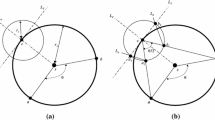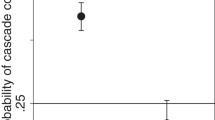Abstract
By providing incentives for sellers to act in a trustworthy manner, reputation mechanisms can mitigate moral-hazard problems when particular buyers and sellers interact infrequently. However, these mechanisms rely on buyers sharing their private information about sellers, and thus may suffer from too little feedback when provision is costly. We experimentally compare a standard feedback mechanism to one in which sellers can inspect a buyer’s feedback-provision history, thus providing incentives to share private information even when costly. We find fairly high trust and trustworthiness in all markets, with buyers providing costly feedback, especially negative, sufficient to induce trustworthiness. However, feedback-provision histories did not improve outcomes, and at least weakly decreased trustworthiness with experienced participants, as this information enabled sellers to discriminate and ship less frequently to buyers lacking a reputation for information sharing.
Similar content being viewed by others
References
Bohnet, I., & Huck S. (2004). Repetition and reputation: Implications for trust and trustworthiness when institutions change. The American Economic Review, 94(2), 362–366.
Bohnet, I., Huck S., Harmgart, H., & Tyran, J. R. (2005). Learning trust. Journal of the European Economic Association, 3(2/3), 322–329.
Bolton, G. E., Katok, E., & Ockenfels, A. (2004). How effective are electronic reputation mechanisms? An experimental investigation. Management Science, 50(11), 1587–1602.
Bolton, G. E., Katok, E., & Ockenfels, A. (2005). Cooperation among strangers with limited information about reputation. Journal of Public Economics, 89(8), 1457–1468.
Carpenter, J. P. (2007). The demand for punishment. Journal of Economic Behavior & Organization, 62(4), 522–542.
Chen, K. Y., Hogg, T., & Wozny, N. (2004a). Experimental study of market reputation mechanisms. In EC’04: Proceedings of the 5th ACM conference on electronic commerce (pp. 234–235). New York: ACM. 10.1145/988772.988810.
Chen, K. Y., Hogg, T., & Wozny, N. (2004b). Experimental study of reputation mechanisms in an exchange economy. Available at http://www.hpl.hp.com/personal/Kay-Yut_Chen/paper/reputationExptOnly.pdf.
Dellarocas, C., & Wood, C. A. (2008). The sound of silence in online feedback: estimating trading risks in the presence of reporting bias. Management Science, 54(3), 460–476.
Ely, J., & Välimäki, J. (2003). Bad reputation. The Quarterly Journal of Economics, 118(3), 785–814.
Engelmann, D., & Fischbacher, U. (2009). Indirect reciprocity and strategic reputation building in an experimental helping game. Games and Economic Behavior, 67(2), 399–407.
Fehr, E., & Gächter, S. (2000). Cooperation and punishment in public goods experiments. The American Economic Review, 90(4), 980–994.
Fischbacher, U. (2007). z-Tree: Zurich toolbox for ready-made economic experiments. Experimental Economics, 10(2), 171–178.
Gazzale, R. S. (2005). Giving gossips their due: information provision in games with private monitoring. Economics department working paper, Williams College, url: http://ideas.repec.org/p/wpa/wuwpga/0508002.html.
Gazzale, R. S., & Khopkar, T. (2009). Remain silent and ye shall suffer: seller exploitation of reticent buyers in an experimental reputation system. Department of Economics Working Papers 2008-22, Williams College.
Huck, S., Lünser, G. K., & Tyran, J. R. (2006). Competition fosters trust. Discussion Paper DP6009, Centre for Economic Policy Research.
Johnson, E. J., Camerer, C. F., Sen, S., & Rymon, T. (2002). Detecting failures of backward induction: monitoring information search in sequential bargaining. Journal of Economic Theory, 104(1), 16–47.
Kandori, M. (1992). Social norms and community enforcement. Review of Economic Studies, 59(1), 63–80.
Li, L. I., & Xiao, E. (2010). Money talks? An experimental study of rebate in reputation system design. SSRN eLibrary, url: http://ssrn.com/paper=1597764.
Nikiforakis, N. (2008). Punishment and counter-punishment in public good games: can we still govern ourselves? Journal of Public Economics, 92(1–2), 91–112.
Nowak, M. A., & Sigmund, K. (1998). Evolution of indirect reciprocity by image scoring. Nature, 393, 573–577.
Ostrom, E., Walker, J., & Gardner, R. (1992). Covenants with and without a sword: self-governance is possible. The American Political Science Review, 86(2), 404–417.
Resnick, P., & Zeckhauser, R. (2002). Trust among strangers in Internet transactions: empirical analysis of ebay’s reputation system. In M. R. Baye (Ed.), Advances in applied microeconomics: Vol. 11. The economics of the Internet and E-commerce. Amsterdam: Elsevier.
Resnick, P., Zeckhauser, R., Swanson, J., & Lockwood, K. (2006). The value of reputation on ebay: a controlled experiment. Experimental Economics, 9(2), 79–101.
Selten, R., & Stoecker, R. (1986). End behavior in sequences of finite prisoner’s dilemma supergames: a learning theory approach. Journal of Economic Behavior & Organization, 7(1), 47–70.
Siegel, S., & Castellan, Jr. N. J. (1988). Nonparametric statistics for the behavioral sciences (2nd edn.). New York: McGraw-Hill.
Author information
Authors and Affiliations
Corresponding author
Rights and permissions
About this article
Cite this article
Gazzale, R.S., Khopkar, T. Remain silent and ye shall suffer: seller exploitation of reticent buyers in an experimental reputation system. Exp Econ 14, 273–285 (2011). https://doi.org/10.1007/s10683-010-9267-z
Received:
Accepted:
Published:
Issue Date:
DOI: https://doi.org/10.1007/s10683-010-9267-z




